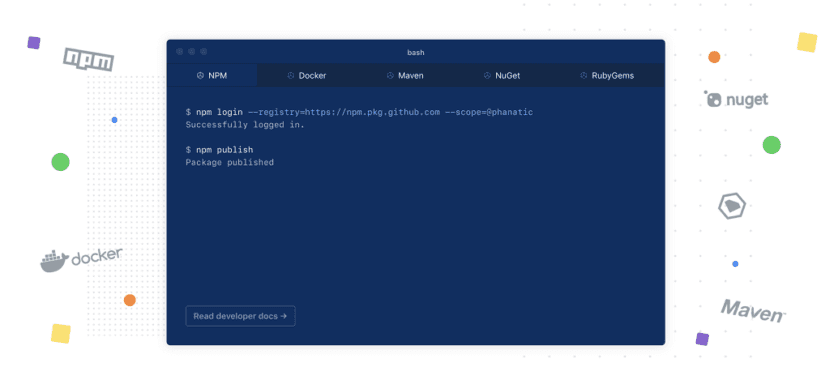
GitHub announced the release of the new Service Package Registry, in which developers have the opportunity to publish and distribute packages with applications and libraries.
Service Package Registry supports the creation of private package repositories which are available only to certain groups of developers and public repositories for package delivery out of the box for your programs and libraries.
About Service Package Registry
The featured Service Package Registry service allows code development and package preparation in one place, as well as organizing a centralized dependency delivery process directly from GitHub.
In this way, specific intermediaries and repositories of specific packages for different platforms are avoided.
The Service Package Registry announcement describes:
GitHub Package Registry is fully integrated with GitHub, so you can use the same search, navigation, and management tools to find and publish packages as you do for your repositories.
You can also use the same user and team permissions to manage code and packages together. GitHub Package Registry provides fast and reliable downloads backed by the global GitHub CDN.
And it's compatible with familiar package management tools: JavaScript (npm), Java (Maven), Ruby (RubyGems), .NET (NuGet), and Docker images, with more to come.
To install and publish packages using the Service Package Registry, se can use existing package managers and commands like npm, docker, mvn, nuget, and gem.
Based on user preferences, one of the external package repositories provided by GitHub is connected: npm.pkg.github .com, docker.pkg.github.com, maven.pkg.github.com, nuget.pkg.github.com or rubygems.pkg.github.com.

When working on a project that has dependencies on packages, it is important that you trust them, understand their code, and connect with the community that built them.
And within organizations, you must be able to quickly find what has been approved for use.
Packages, together, with your code
To speed up packet loading, a global caching content delivery network is used which is transparent to users and does not require a separate selection of duplicates. For publishing packages, the same account is used as for accessing the code on GitHub.
In fact, in addition to the "tags" and "releases" sections, a new "packages" section has been proposed, the work of which is seamlessly integrated into the current process of working with GitHub.
Packages hosted on GitHub include download details and statistics, along with their complete history, so you know exactly what's included.
This makes it easy to find and use the correct package as a dependency for your project, and increases your confidence that it only contains what is advertised. With more information about the packages you publish, you can understand exactly how other people and repositories use them.
The search service has been expanded with a new section to search for packages. Existing access rights settings for code repositories are automatically inherited for packages, allowing you to control access to both code and packages in one place.
A web-based linking system is provided to connect your controllers called before or after publication and an API to integrate external tools with the Service Package Registry. A report with download statistics and version history is also available.
Can I try Service Package Registry?
Currently, the Service Package Registry, is currently in beta testing phase, in which, prior to request, access is provided free of charge for all types of repositories.
After the test is finished, free access will be restricted only to public repositories and open source repositories.
For developers of open source projects, the proposed service can be useful to organize pre-release testing before forming final releases that fall into the main repositories.